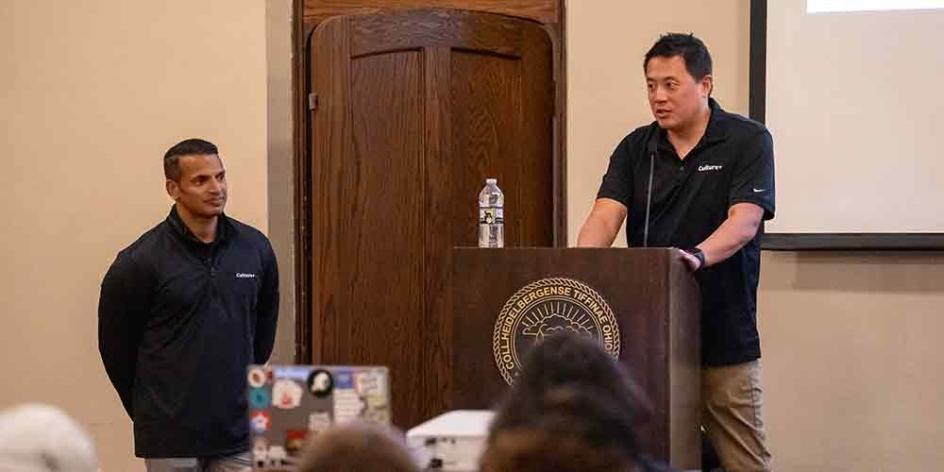
Students, staff, and local community members gathered Tuesday evening to hear from Mohammad “Mo” Anwar and Jeff Ma, co-founders of Softway and authors of the thought-provoking book, Love as a Business Strategy. This event, part of Dr. Trish Berg's "Lessons in Leadership" series, promised to offer more than just business insights. This event was about the human side of leadership, the power of vulnerability, and the courage to change.
In her introduction of her close friends, Trish said, “They truly know how to treat people like people,” setting the tone for an evening dedicated to personal and professional growth.
The session began with Mo recounting his journey from a 15-year-old immigrant to the United States to the CEO of a thriving tech company. Starting Softway from his college dorm 21 years ago, he quickly rose to lead a team of over 300 employees. "I felt like I had it all," he shared. Yet, beneath the surface, the company was struggling, and he was about to face a wake-up call that would change his life and the future of Softway.
Mo’s moment of reckoning came during what he refers to as the “fridge incident.” Frustrated by the state of the office refrigerator, he fired off an angry, company-wide email, berating his employees. The backlash was immediate and eye-opening. This event marked the beginning of his realization that his leadership style damaged the company’s culture. As financial troubles continued, he resorted to unfortunate measures, laying off one-third of his employees via email – a decision that further distanced him from his team.
Reflecting on that time, Mo said, “Honesty without kindness is brutality. Kindness without honesty is manipulation.” This statement highlighted the struggle he faced: balancing authority with empathy and accountability with care. It was a challenge that would ultimately push him to change.
Amidst the problems at Softway, Mo attended a University of Houston football game with his brother—a break from the pressures of running a failing business. The Cougars were losing and and the stadium began to empty, yet Mo remained hopeful. In a thrilling comeback, his team won, and in the post-game interview, Houston Head Coach Tom Herman attributed their victory to “love and support.” This unexpected message struck a chord with Mo, prompting him to re-evaluate his approach to leadership. “The lack of self-awareness is why people fall off with anything,” he later reflected as he decided to change his ways.
Inspired, Mo returned to work with a new resolve, focusing on fostering a culture of love. He began collaborating closely with Jeff and co-authors Chris Pitre and Frank Danna to lay the groundwork for a business built on love.
Together, Mo and Jeff developed what they call the “six pillars of love”: inclusion, empathy, forgiveness, vulnerability, trust, and empowerment. Each pillar became a cornerstone of their leadership philosophy. Mo emphasized that “Love is about being honest, love encourages us to be honest and truthful, to seek true harmony.” This honesty was not just about facing others but looking in the mirror, admitting and learning from past mistakes and making real, meaningful change.
In their discussion on inclusion, Mo and Jeff shared a story about hosting international colleagues and realizing that U.S. culture wasn’t as inclusive as they had assumed. Now, they strive to create an environment that welcomes diverse perspectives, and they make efforts to connect with those who show interest in their work—often through thoughtful gestures like personalized gift baskets.
The speakers didn’t shy away from the discomfort of vulnerability. “At the end of the day you have to reflect and apologize to those you might have hurt,” Mo said, acknowledging the importance of humility in leadership. By doing so, he was able to regain the trust of his team and move forward. Trust, as they explained, isn’t something that can be demanded; it’s earned through consistency, expertise, and building genuine relationships over time.
Empowerment, the final pillar, was about enabling others to thrive. Jeff described their first experience consulting for another company’s culture, not because they had to, but because they truly wanted to help others succeed. “You have to take intentional steps,” he emphasized. “It has to be part of your everyday life.”
As the session drew to a close, Mo left the Heidelberg audience with a question that lingered: “Would you want to be home on a Sunday evening, feeling anxious about going to work the next day?” His answer was clear in a world that prioritizes profit over people: “Change starts with us. We don’t need to wait for the world to change.”
With that, the audience left inspired, equipped not only with the practical insights from Mo and Jeff’s journey but also with a call to embrace authenticity, kindness, and courage in their own lives.
“Be genuine from the start,” Jeff urged, “and have the courage to speak about it.” It was a powerful reminder that the true heart of leadership lies in seeing people as people—and treating them with the respect they deserve.
— by Kaidan Mathias ‘25